
Živela smrt
Koliko je opasna pretnja nuklearnog rata? Veoma, ako se o tome razmišlja racionalno. Ovo naravno nije nepoznato u teoriji igara od fon Nojmana do posebno Tomasa Šelinga.
More...We kindly inform you that, as long as the subject affiliation of our 300.000+ articles is in progress, you might get unsufficient or no results on your third level or second level search. In this case, please broaden your search criteria.

Koliko je opasna pretnja nuklearnog rata? Veoma, ako se o tome razmišlja racionalno. Ovo naravno nije nepoznato u teoriji igara od fon Nojmana do posebno Tomasa Šelinga.
More...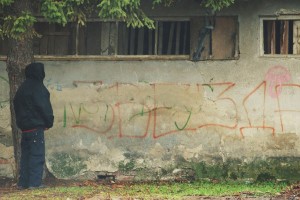
Eh, kakav nesrećan sticaj okolnosti. Bez ikakvih zlih namera prema narodu Ukrajine, sasvim indiferentni prema Putinu, koreografi među navijačima – neka bude da su navijači – Crvene zvezde dosetili su se kako u nedelju uveče sa stadiona da pošalju poruku… zaista, kome? Kažu, svom timu i uzgred navijačima Partizana. Istina, poruka je bila nešto složenija: da bi se ispravno razumela, zahteva fotografsko pamćenje i dobro poznavanje istorije domaće kinematografije. Dakle, ima jedan film Slobodana Šijana iz 1982, snimljen po pozorišnoj drami Dušana Kovačevića iz 1972: zove se „Maratonci trče počasni krug“. A u filmu ima jedna scena (uskrsnuća) na groblju: i baš tu scenu hteli su da dozovu u sećanje i iskoriste za svoju poruku navijači Zvezde.
More...
Mihail Borisovič Hodorkovski, bivši vlasnik JUKOSA-a, posetio je Donjeck. Kada je izrazio želju da uđe u zdanje oblasne administracije koje su okupirali separatisti, na ulazu su ga zaustavili maskirani ljudi s obrazloženjem da se on „o svim događajima u Donbasu može obavestiti putem ruskih sredstava javnog informisanja“. Prošlo je dva sata od ovog nemilog slučaja, a gospodin Denis Pušilin, nekada rukovodilac donjecke finansijske piramide MMM, a danas na čelu samozvane Donjecke narodne republike, na lako pucketanje moćnih prstiju Rinata Ahmetova, brže-bolje je dotrčao u hotel Donbas-palas, ne bi li se sreo sa Hodorkovskim.
More...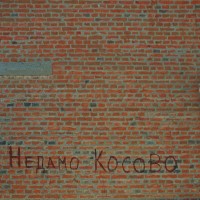
Bila sam u Ukrajini krajem januara. Provela sam tamo neko vreme s Natalijom Gumenjik i Pjotrom Ruzavinom. Natalija je jedna od vodećih ukrajinskih novinarki, a Pjotr je ruski istraživački novinar. Njih dvoje su u braku. Posle jedne večere, Pjotr je rekao, „Ne mogu da zamislim vazdušne napade na Kijev“. Jezik mi je bio brži od pameti: „Da, isto kao što je bilo nemoguće zamisliti ih u Beogradu“. Mislila sam na NATO kampanju bombardovanja u Jugoslaviji koju sam pratila na terenu. Bila sam u Beogradu kada su prve bombe pale na grad, kada se nezamislivo pretvorilo u stvarnost. Pjotr je u to vreme bio srednjoškolac, ali znao je o čemu govorim. „To nam stalno ponavljaju ovi odozgo“, rekao je, misleći na propagandiste iz Kremlja, koji vazdušnu kampanju iz 1999. koriste kao presedan i opravdanje za svoje postupke.
More...
Smatra se da ko god nije pristalica konsenzusa o neophodnoj pobedi zapadnih vrednosti u Ukrajini, i plaćeničko izveštavanje o tome smatra lakrdijom, sigurno je podlegao muževnom šarmu Vladimira Vladimiroviča Putina.
More...
Neko je rekao Ukrajina nije ni Bosna niti Kosovo. Zaista, reč je o najvećoj evropskoj zemlji, po teritoriji, ako se računaju samo one koje su u celini na evropskom kontinentu. Ima stanovništvo od oko 45 miliona. Doduše, u sporu je sa znatno većim susedom, ali i tako posmatrano to nije tek neki od balkanskih sporova. Evropska, pa i svetska, bezbednost su ulog ovog spora. Šta je predmet spora?
More...
Mogao je predsednik Ukrajine Vladimir Zelenski pogrešiti kao što je pogrešio predsednik Gruzije Mihail Sakašvili kada je 2008. naredio vojsci da na silu povrati Južnu Osetiju. Rusija je intervenisala, porazila gruzijske jedinice i priznala nezavisnost Južne Osetije. Sakašvili se kasnije oprobao kao političar i u Ukrajini. Podržao je proteste na Majdanu 2014. i od 2015. bio savetnik ondašnjeg ukrajinskog predsednika Petra Porošenka. Porošenka je savetovao i kako da se ponaša prema 2014. samoproglašenim republikama Donjecku i Lugansku na istoku Ukrajine.
More...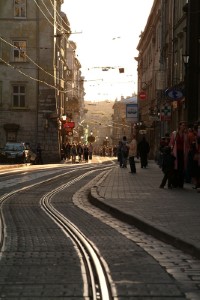
Ratovi proizvode neželjene posledice i retko se završavaju onako kako nas eksperti uveravaju da će se završiti. Pitajte političare iz prošlih vremena koji su nudili ružičaste scenarije ratova u Vijetnamu, Avganistanu i Iraku, da bi se na kraju pokazalo da su bili potpuno u krivu. Pitajte majke vojnika koji su ubijeni ili ranjeni u tim ratovima. Pitajte milione civila koji su njihova „kolateralna šteta“.
More...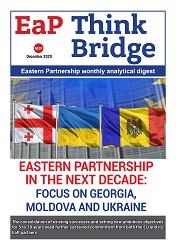
2020 has been a challenging year for the Eastern Partnership.The countries require quite some time to recover from theconsequences of the pandemic for the health care systemand the economy and, perhaps, without the support of foreignpartners, including the EU, they will not recover any soon.Armenia and Azerbaijan will have to start anew the diplomaticpath to normalizing relations after a destructive 44-day war. // CONTENT: Analytica: Eastern Partnership in the Next Decade: Focus on Georgia, Moldova and Ukraine // Azerbaijan: All Efforts to Ensure Karabakh Recovery // Crisis in Post-War Armenia // Belarus: Lukashenko Threatens with NATO Invasion, COVID-19 Pandemic on the Rise // Georgia: One-Party Parliament // Moldova at Crossroads // Ukraine: 2020 Controversial Results in Politics and Epidemic
More...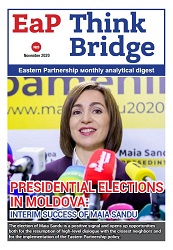
November did not bring the expected calm to the countries of the region, although several important steps were taken towards it. In Moldova, the euphoria over Maia Sandu’s sensational victory in the presidential race has been replaced by exaggerated demands from voters and an unreasonable expectation of quick results from her work. What changes are coming to the country and the region? In Georgia, the opposition does not recognize the election results and refuses to enter the parliament. The country’s legislature risks remaining oneparty with only 90 out of 150 seats filled if the boycott of opposition parties continues. The 44-day war ended in Nagorno-Karabakh. However, the peace agreement, signed at the Kremlin’s proposal, sparked protests in both Azerbaijan and Armenia. In Yerevan, the agreement is called treason and calls for the resignation of the prime minister are loud. Meanwhile, in Baku the opposition is concerned about the deployment of Russian peacekeepers to Karabakh. Protests against the regime of Lukashenko continue in Belarus, as do the use of force by the authorities and arrests of protesters. The most important developments of November in the Eastern Partnership analyzed in our digest. /// CONTENT: Analytica: Presidential Elections in Moldova: Interim Success of Maia Sandu // Azerbaijan: War Ended in a Victory // Crisis in Post-War Armenia // Belarus: Lukashenko Сalls on “Taking No Prisoners” and Closes Borders with the EU // Georgian Parliament with No Opposition // Moldova: New President – New Hopes // Three November Challenges for Ukraine: “COVID”, Anti-Corruption and Financial Ones
More...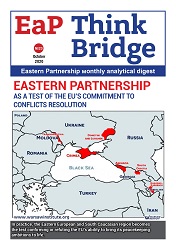
Parliamentary elections in Georgia, presidential elections in Moldova and local elections in Ukraine: the Eastern Partnership sets its course for the next five years. None of the campaigns avoided scandals and surprises, and the final outcome of the vote has not yet been decided. In Belarus, protests against dishonest elections and authoritarian regime do not subside. Armenia and Azerbaijan are facing an even more difficult choice: to alter for the diplomatic conflict resolution in Nagorno-Karabakh and start negotiations or to continue hostilities that claim dozens of lives. What role can and should the European Union play in resolving this and other conflicts in the Eastern Partnership countries? What tools are in the arsenal of Brussels, and which still need to be invented? After all, the request of partner countries for closer attention from the EU to the topic of frozen and active conflicts in the region is more than obvious. All these and other important October developments in the Eastern Partnership are analyzed in our digest. //// CONTENT: Analytica: Eastern Partnership as a Test of the EU’s Commitment to Conflicts Resolution // Azerbaijan: Internal Problems Postponed for the War // Armenia Struggles with War over Nagorno-Karabakh // Belarus: Violence against Protesters and Diplomatic Scandals // Georgia: Street Protests or One-Party Parliament? // Moldova: on the Finishing Straight // How not to get Ukraine Fatigue?
More...
Full-scale hostilities between Armenia and Azerbaijan, unfolded in late September, endangered the security and stability of the entire region. Perhaps, even further cooperation within the framework of the Eastern Partnership, which includes both warring countries, is questionable. Meanwhile, for more than seven weeks now, street protests against unfair elections and the system in general have not subsided in Belarus. The violence of the security forces against the protesters has not stopped as well as. Georgia, Moldova and Ukraine are preparing for elections - parliamentary, presidential and local, respectively. This means that the polarization in the societies is growing. However, it is not only military clashes and political showdowns that endanger the region. While the countries are trying to cope with the crisis in the healthcare system, the economic and humanitarian consequences of the coronavirus pandemic, the information sphere is also under attack. The rampant stream of disinformation about the virus has become a test for strength – for the states, the media, and civil society, a real “combat” test of their readiness to defend their information security. After all, the goal of fakes in most cases is to sow panic and undermine confidence in the state. All these topics and some more can be found in the latest issue of our digest. //// CONTENT: Analytica: Coronavirus Сrush Test: Disinformation Resilience of the EaP States and Romania // Azerbaijan: State of War and Military Mobilization // Armenia at War // Belarus: 50 Days of Protests, West Doesn’t Recognize Lukashenko as Legitimate // Georgia under Risk to be Involved in South Caucasus Conflict // Turmoil in Moldova amid the electoral period, the pandemic and a contested governance process // Ukraine: New Trend of “Economisation” for Domestic and Foreign Policies
More...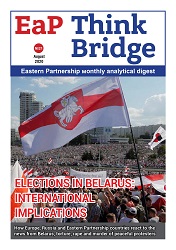
Despite the obvious irregularities in the electoral process in Belarus and the brutal use of force against peaceful protesters, three out of the five leaders of the Eastern Partnership countries hastened to congratulate Alexander Lukashenko on his victory. The European Union has expressed its traditional concern and has already announced sanctions. And Russia, although it supports the regime, is in no hurry to take action. What did Belarusians expect from their neighbors and Europe? What should the next steps be? And how will the situation affect the entire Eastern Partnership region? Belarus is the central topic in the new issue of our Digest, as well as of the international expert discussion on September 4. Also in this issue: the first candidates and blocs came forward in the upcoming elections in Moldova and Georgia. Quarantine is not an obstacle to the beginning of the electoral process and high-profile layoffs in the anti-corruption bodies in Ukraine. A wedding during an epidemic became pretext for a political scandal in Azerbaijan. Armenia has focused on its national security. All the main events of the month in the Eastern Partnership are analyzed in the Think Bridge Digest. //// CONTENT: Analytica: Border Tensions between Armenia and Azerbaijan: Military and Political Implications // Azerbaijan: Authorities’ War on Two Fronts // Armenia: Public Health Crisis Improves, but Defense Concerns Continue // Belarus: Pre-Election Repressions and Economic Voluntarism // Georgia: Opposition Unites ahead of Elections // Is Moldova Still “Learning” How to Be Independent and Democratic? // Ukraine on the Brink of New Political Season // Eastern Partnership Civil Society Forum News
More...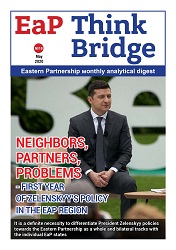
During the first year at the office, President of Ukraine Vladimir Zelenskyy hardly managed to set, or at least explain his team’s foreign policy priorities. However, the Eastern Partnership did not go unnoticed on his agenda in multiple dimensions: as an instrument of cooperation with the European Union, as a region as a whole, and at the level of bilateral contacts with partner countries. Which of these tracks was more important and who did Ukraine manage to work with more efficiently while ignoring other capitals so far? The results of the first year of President Zelenskyy for the Eastern Partnership are analyzed by Hanna Shelest. Meanwhile, in May, election campaigns launched in three countries of the region. In Belarus it started with the crackdown on the opposition, fines and arrests. In Moldova President Dodon started campaigning, in spite of all anti-epidemic measures. In the meantime, in Georgia it is still not clear which law will be applied to the parliamentary elections in October as the authorities and the opposition are still failing to find compromise. Last month, Armenia was one of the first to lift quarantine restrictions and immediately faced a new wave of incidence of COVID-19. The prime minister and his entire family tested positively for coronavirus. In May, Azerbaijan faced a wave of arrests, with both the opposition and government officials behind bars. And Ukraine managed to get into two high-profile international scandals and new difficulties in relations with its partners, the United States and Georgia. All these and other major developments of the month in the countries of the Eastern Partnership are analyzed in our traditional reviews. /// CONTENT: Analytics: Neighbors, Partners, Problems - First year of Zelenskyy’s Policy in the EaP Region // Azerbaijan: Continued Arrests of Opposition and Executives // Armenia Staggers & Stumbles // Belarus: Street Parade and Elections in Time of Epidemic // Georgia: Searching for a Way Out of the Deadlock // The Moldovan Political Chess Game Started // Ukraine: Diplomatic Actions, Financial Expectations and the President’s May Theses
More...
Vest o ubistvu Arkadija Babčenka i potom vest o tome da je živ bile su glavni medijski događaj prošle nedelje ne samo u ukrajinskim i ruskim, već i u svetskim medijima. Reski prelaz iz žalosti u praznik (kod nekih verovatno sasvim obratno – iz praznika u žalost) kod mnogih je izazvao buru emocija, isprovocirao ih da se razmašu i daju pomalo brzoplete izjave. Jedni likuju zbog blistave operacije ukrajinske službe bezbednosti (SBU) i sramotnog kraha kremaljskih ubica, a drugi grde Babčenka što ih je doveo u zabludu, emotivno ih potresao i naterao da pišu nekrologe sa kojima sada ne znaju šta da rade.
More...
Rusija danas vodi dva agresivna rata, jedan protiv Ukrajine koji je započela 2014. i drugi u Siriji u koji se braneći diktatora Asada umešala u jesen 2015. godine. Što se Ukrajine tiče, do danas je tamo poginulo više od 10 hiljada njenih građana, a što se ruskog agresora tiče, budući da zvanično „nas tamo nema“ – ne znamo. Ali ako izbrojimo sva naša vojna lica koja svoje „godišnje odmore“ koriste u turističkom raju na jugoistoku Ukrajine i sve „dobrovoljce“ koji tamo s radošću borave, broj naših žrtava je po svoj prilici blizak onim ukrajinskim. U Siriji je nešto drugačija situacija. U zavisnosti od procene raznih eksperata, tamo se ukupan broj ljudskih žrtava proteže unutar teško shvatljivog dijapazona od 400 hiljada do celih milion poginulih ljudi. Proceniti ruski „doprinos“ ovom broju je zaista teško, ali ako uračunamo razmere i učestalost naših bombardovanja i tome dodamo činjenicu da bez naše svesrdne podrške Asad ne bi mogao tako dugo i uspešno da istrebljuje svoj narod, u većoj ili manjoj meri sva krv prolivena u Siriji pada na savest ruskog agresora.
More...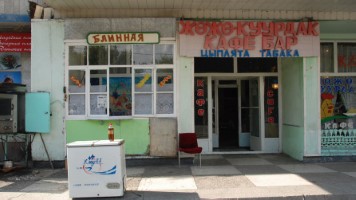
Pored sve nesreće koja već godinama potresa Ukrajinu, na njenoj teritoriji su se u samo jednom danu (23. marta 2017) dogodila dva teroristička napada. Oba se mogu pripisati Rusiji. Prvi se dogodio u gluvo doba noći, u skladištima raketne vojne tehnike u blizini grada Balakleja u Harkovskoj oblasti. Od snažnih eksplozija je teško ranjena jedna žena, a stanovništvo u radijusu od 5 klimetara je hitno evakuisano. Drugi se dogodio u centru Kijeva, ispred hotela Premijer-Palas gde je usred bela dana ubijen bivši poslanik ruske državne Dume Denis Voronjenkov. On se krajem 2016, zajedno sa svojom suprugom Marijom Maksakovom (takođe bivšom poslanicom), preselio u Kijev, primio ukrajinsko državljanstvo i prihvatio obaveze da svedoči u procesu protiv svrgnutog proruskog ukrajinskog predsednika Viktora Janukoviča.
More...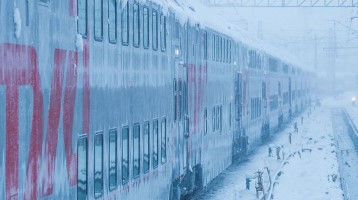
U svesti ljudi se ponekad stvaraju polja zatvorena za svest, koja psiholozi nazivaju „slepim mrljama“. To su obično sećanja na neku tragediju ili zločin, koja mogu da povrede ljudsku psihu i dovedu je do sloma. Svesrdnim trudom ruske propagande, u društvenoj svesti njenih građana i sama Rusija se pretvara u takvu „slepu mrlju“. Na federalnim televizijskim kanalima ima sve manje mesta za ozbiljne razgovore o njenim problemima.
More...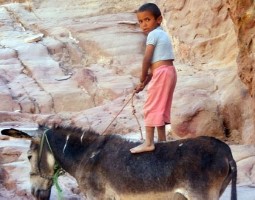
Copycat iz Kopenhagena se uspešno zapisao u istoriju sa dva ubistva i nekih pet ranjenih: ubijeni su režiser dokumentarnih filmova i čuvar sinagoge, ranjeni su policajci. Na tribini o slobodi govora bili su francuski ambasador u Danskoj i autor prvih karikatura o Muhamedu, koji već deset godina živi pod policijskom zaštitom, a bar dva puta su ga spasli u zadnjem trenutku. Na zvučnom zapisu događaja čuje se ženski glas koji na kultivisanom engleskom problematizuje ono „ali“, koje su svi u svetu što ih je pariski pokolj naveo da misle, prepoznali kao najozbiljniji problem razumevanja, tačnije prepreku, neku vrstu cenzure da se misleći suoče sa stvarnošću, svojim strahovima i svojom potrebom uravnoteženja: nazvala sam ih „poravnjači“. I dok žena razvija svoj argument, počinju pucnjevi, nekih dvadesetak. Kraj razgovora. No možda, i kraj neodgovorne „ali“ navike: grozota sveta u kojem živimo, u kojem se ljudi obezglavljuju pred kamerama, na obali mora i uz šum talasa u pažljivoj scenografiji, zaustavlja zauvek tu stvar. Ko je kome i kada naneo zla kao „razlog“ više ne može da se ozbiljno uzima u obzir: sada, svuda, svaka žrtva mora da se zabeleži i obradi shodno pravu, lokalnom i međunarodnom. Kroz užase ove zime smo odvratno brzo sazreli u humanizmu i ljudskim pravima.
More...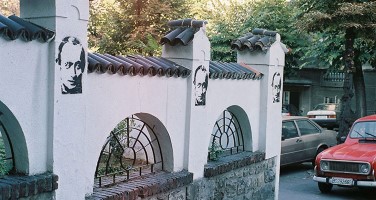
Ivan Krastev u intervjuu za RSE kaže da iz perspektive Moskve sukob u Ukrajini nije sukob Rusije i Zapada, već Rusije i SAD. On je direktor Centra za strateške studije u Sofiji i stalni saradnik bečkog Instituta za društvene nauke (IWM). U nizu tekstova objavljenih u posljednje vrijeme, Ivan Krastev govori o Balkanu kao mogućem prostoru za Putinovo nadmetanje sa Zapadom.
More...